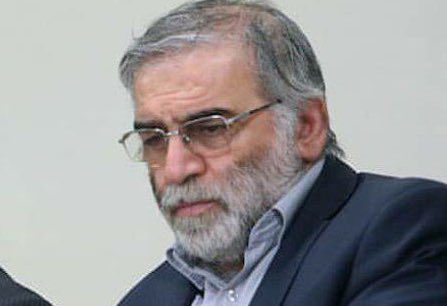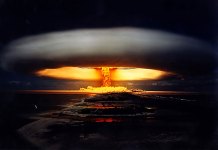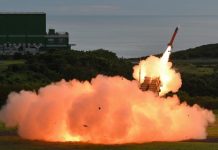Iranian President Hassan Rouhani directly accused Israel of assassinating Mohsen Fakhrizadeh, the Islamic country’s prominent nuclear scientist. He, however, added that the country cannot be “trapped into making a hasty decision” of retaliation against the attack.
UAE Visa Ban Starts To Pinch Pakistan; 3000 Jobs Lost In First Week As Indian Workers Rejoice
“Once again, the wicked hands of the global arrogance, with the usurper Zionist regime as the mercenary, were stained with the blood of a son of this nation,” he said in a statement on his official website on Saturday.
He added that the assassination of Fakhrizadeh shows the “despair and the depth of the enemy’s hatred” towards Iran, saying that his “martyrdom will not slow down the country’s achievements.”
Israeli Prime Minister Benjamin Netanyahu had in 2018 mentioned Fakhrizadeh’s name in a press conference, saying, “remember that name” — something that has now raised the speculation of his government’s involvement in the killing. At the same time, Israeli social media users hailed the killing of the nuclear scientist.

This comes at a time when there is increasing speculation of Iran enriching Uranium in large quantities, which is an important component for pursuing civilian and military use of nuclear weapons.
However, experts still claim that there is no evidence of a current nuclear weapons program in Iran. In fact, the US State Department Compliance Report recently reaffirmed that there were no current nuclear weapons activities in Iran. Although, Netanyahu and Trump have been very apprehensive of the Iranian rhetoric of the development of a nuclear weapon after the latter scuttled the Obama-era nuclear deal with the country.

The Western intelligence agencies believe that Fakhrizada was at the heart of Iran’s secret nuclear weapons program and diplomats from many countries have often called him the “father of the Iranian bomb”. The country has repeatedly maintained that its nuclear program has always been for civilian purposes.
In a televised speech to the nation on November 28, Rouhani said: “Our people are wiser than to fall in the trap of the Zionist regime (Israel) … Iran will surely respond to the martyrdom of our scientist at the proper time.” Iran’s Foreign Minister Mohammad Javad Zarif also blamed Israel for the attack, demanding that the Western nations, and particularly the European Union, condemn the ‘act of state terror’ immediately.
Terrorists murdered an eminent Iranian scientist today. This cowardice—with serious indications of Israeli role—shows desperate warmongering of perpetrators
Iran calls on int'l community—and especially EU—to end their shameful double standards & condemn this act of state terror.
— Javad Zarif (@JZarif) November 27, 2020
The Islamic nation’s supreme leader Ayatollah Ali Khamenei also called for “punishing” those behind Fakhrizadeh’s assassination. His statement called for “following up on this crime and certainly punishing the perpetrators and those responsible, and .. continuing the scientific and technical efforts of this martyr in all of the fields he was working in”.
دانشمند برجسته و ممتاز هستهئی و دفاعی کشور جناب آقای #محسن_فخریزاده به دست مزدوران جنایتکار و شقاوتپیشه به شهادت رسید. این عنصر علمی کمنظیر جان عزیز و گرانبها را به خاطر تلاشهای علمی بزرگ و ماندگار خود، در راه خدا مبذول داشت و مقام والای شهادت، پاداش الهی اوست.
— KHAMENEI.IR | فارسی (@Khamenei_fa) November 28, 2020
In 2015, the New York Times compared Mohsen Fakhrizadeh to J. Robert Oppenheimer, the physicist who planned the Manhattan Project in the United States to build the first nuclear weapon during World War II. Born in 1958 in the Iranian city of Qom, Fakhrizadeh was a physics professor and is said to have led covert Iranian project ‘Amad’, a 1989 program to research the potential for building a nuclear bomb.
The program was closed down in 2003, the International Atomic Energy Agency (IAEA) confirmed. However, Israel recovered documents in 2018 that ‘proved’ that the slain scientist was continuing to clandestinely lead the ‘Project Amad’. According to IAEA, the country had more than 12 times the amount of enriched uranium than permitted under the deal as of 2020.
The tensions between the US and Iran have escalated, peaking in January with America’s assassination of Gen Qasem Soleimani, commander of the Iranian Revolutionary Guards’ Quds Force. There have been speculations that the US, along with Israel, may attack the Islamic Republic to stop it from developing its nuclear weapons.
However, it is highly likely that Iran will retaliate only after Trump has left office, since Biden may not be so friendly with Israel, nor Saudi Arabia.
While the Republican Party members, along with Israel, celebrated the death of Iran’s top scientist, others expressed their condemnation of the act.
If the primary purpose of the killing of Mr. Fakhrizadeh was to make it harder to restart the Iran nuclear agreement, then this assassination does not make America, Israel or the world safer.
— Chris Murphy (@ChrisMurphyCT) November 27, 2020
Former CIA Director John O. Brennan dubbed the assassination as a ‘reckless act’.
This was a criminal act & highly reckless. It risks lethal retaliation & a new round of regional conflict.
Iranian leaders would be wise to wait for the return of responsible American leadership on the global stage & to resist the urge to respond against perceived culprits. https://t.co/0uZhyBTM3S— John O. Brennan (@JohnBrennan) November 27, 2020
The incident, Israeli politicians said, will severely hamper Iran’s nuclear weapons program, but they accepted it will not completely stop. There is always a replacement, they said.
An expert talking to the EurAsian Times who did not wish to be named said you could expect more provocations in the Middle-East. Ideally, Israel would want Iran to react with a retaliatory attack against the US or Israel as the duo of Trump and Netanyahu are itching to take-out Iran’s Nuclear Weapons. Expect the Unexpected in the coming weeks!




